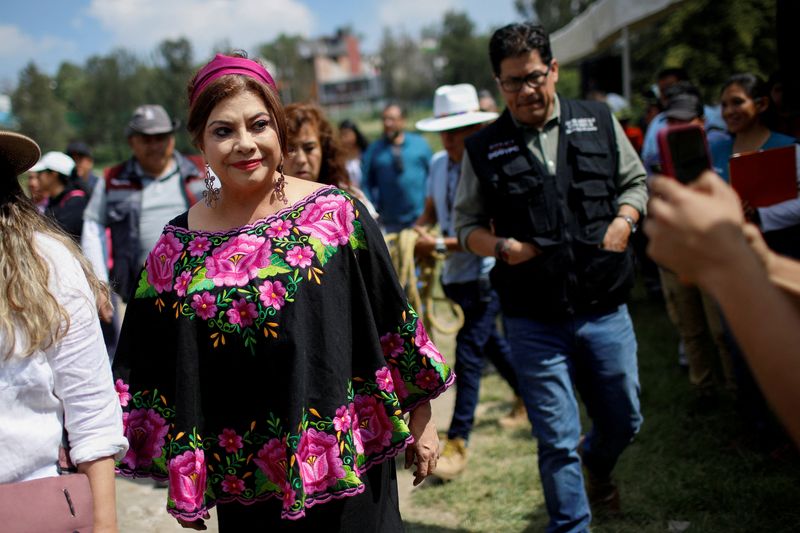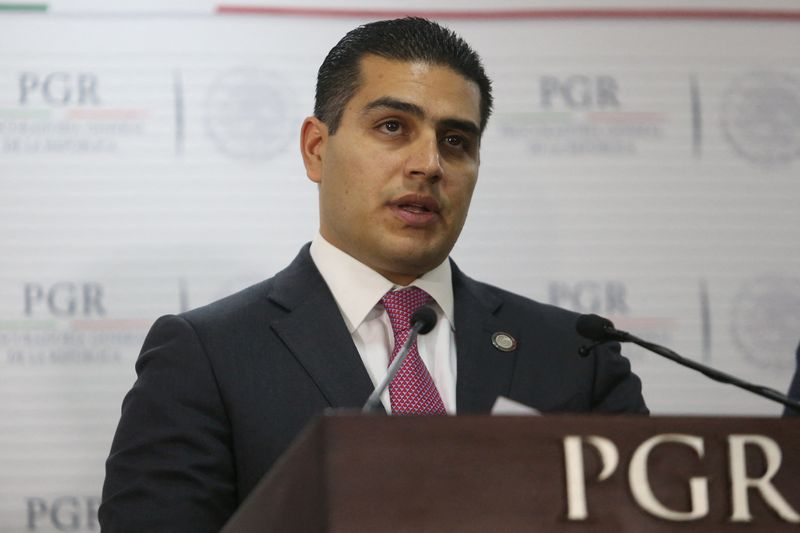By David Alire Garcia
MEXICO CITY (Reuters) – When Mexico’s governing party unveiled the winner of its poll to pick a Mexico City mayoral candidate, the result was clear – but the male victor quickly had to give way to female runner-up Clara Brugada to meet new gender parity rules now reshaping Mexican politics.
Last weekend’s leapfrogging of the most popular contender in the National Regeneration Movement (MORENA), Omar Garcia Harfuch, was one of the clearest illustrations yet of the challenges Mexico faces enacting rules that mandate equal candidacies for women across thousands of top political jobs.
Mexico’s national electoral authority INE last month resolved that all political parties must nominate at least five women to compete for the nine elections next year to head regional governments, including the capital Mexico City – part of a decades-long push for greater representation that has led to dramatic results in the socially conservative country.
Gender quotas have led to rapid advances for women. Since 2018, Congress has been split 50-50, and nine of 31 state governors are now women – up from only one woman state governor five years ago.
The gains includes the first ever woman to lead the country’s Supreme Court, plus the first female governor of the central bank.
On Nov. 11, President Andres Manuel Lopez Obrador’s leftist MORENA party, tapped Brugada to be its Mexico City mayoral candidate even though party-commissioned polling to find a winner gave Garcia Harfuch, the city’s former police chief, a nearly 14-point victory margin.
“I think there will be tensions, but ultimately deals will be made at the top,” said Violeta Vazquez-Rojas, a Mexican political analyst who tracks gender equality. “The culture of parity has already been established.”
Vazquez-Rojas noted that MORENA party leaders selected women with the most support to meet the 2024 gubernatorial quotas. If different criteria began being applied, friction could arise, she said.
Efforts to get around the rules have sparked controversies like when 17 men in Oaxaca state were in 2018 disqualified as candidates after falsely claiming to be transgender women.
Still, affirmative action policies had been hugely important, said MORENA Senator Olga Sanchez Cordero, a former president of the Senate, Supreme Court justice and ex-interior minister.
“If not, we wouldn’t have gotten anywhere,” she said, anticipating that some parties will challenge the latest rule.
Weighting of candidates elected by proportional representation has ensured parity in Congress, but achieving it for winner-takes-all posts at municipal level is much harder.
Women only make up around a quarter of nearly 2,500 mayors, though that is 10-points higher than the average for Latin America and the Caribbean, according to a study last year.
SET IN STONE
The push that also saw Lopez Obrador opt for gender parity in his first cabinet has ushered in a broader shift that looks very likely to yield Mexico’s first woman president next year.
Carla Humphrey, an INE commissioner who has helped lead the charge for equal representation, said the watershed dates back to gender parity recommendations enshrined in law in the 1990s. They were buttressed by 2012 changes that meant parties could have candidates disqualified if the rules were not met.
Since 2019, Mexico’s constitution requires gender parity in all elected positions. “What have we done? We’ve made this principle concrete,” said Humphrey.
Mexican writer Margo Glantz, who has lent a sharp feminist edge to her works, including a study of Sor Juana Ines de la Cruz, a pioneering 17th century Catholic nun and intellectual, said parity rules were only part of the solution to entrenched sexism.
Just because a woman holds power does not mean her tenure will be successful, she said, pointing to Guerrero state Governor Evelyn Salgado, who was picked by MORENA in 2021 as a 11th-hour replacement for her father after he was disqualified from competing in the gubernatorial race amid controversy.
Glantz noted that critics have panned Salgado as being slow to respond to Hurricane Otis, which last month devastated Guerrero’s beach resort of Acapulco, killing dozens of people. Salgado has defended her relief efforts, saying she is working “tirelessly” to help the city’s tourist-dependent economy.
“Parity is necessary, but it’s not enough,” Glantz argued. “What’s necessary is having people who are brave enough that they can govern well, culturally and socially.”
(Reporting by David Alire Garcia; Editing by Dave Graham)

